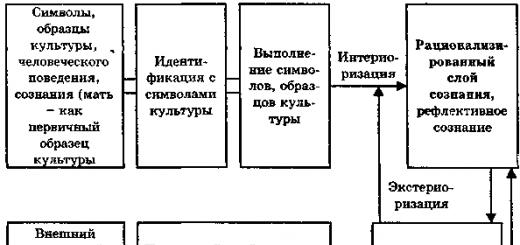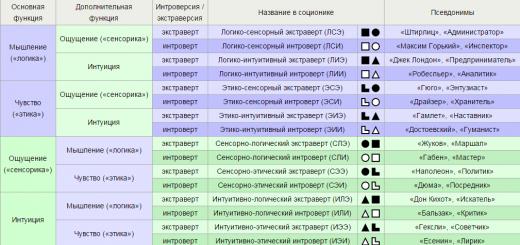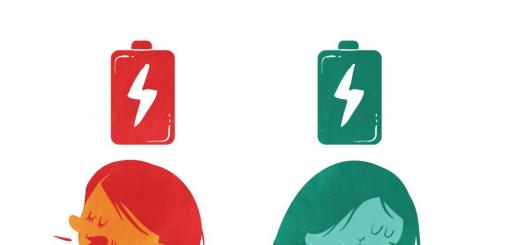Socionics is the concept of personality types and relationships between them.
The doctrine of socionics, for which types of people are the object of study, was founded in the 1970s. Socionics was created by Aushra Augustinavichyute on the basis of Jung's psychotypes.
Aushra worked at the Ministry of Finance of the Republic of Latvia, while teaching political economy at higher educational institutions. Aushru joined the Faculty of Family Studies of the Vilnius Pedagogical Institute, where she began to describe a new approach to personality typing. She began to publish her own books, where she gave all her views on the typology of people's personality.
So, socionics as a science is studying the laws according to which the human psyche perceives and processes information about everything around. With the necessary data, you can predict the behavior of other people, determine their qualities and abilities, and understand what to expect from them. Socionics is of great importance for self-knowledge and self-development.
Socionics is based on system approaches and modeling. It does not belong to the areas and areas of study of psychology or sociology, but is an independent direction. The main problem of socionics is the lack of objective criteria for determining the type of person.
Since they were established speculatively, it becomes impossible to strictly and scientifically determine and verify the results of psychological typing. That is why socionics does not belong to the sciences, but is only a doctrine or direction. However, it is recognized by many leading psychologists.
As a kind of sociopractice, it helps to understand and improve human relationships and joint activities. Ideas about sociotypes, psychological aspects and intertype interactions are applied in the ordinary life of each of us.
Personality types in socionics

Jung compiled a classification of psychotypes, highlighting eight different options. When compiling descriptions, Jung took into account such interesting features as intuitive, sensory, extraversion, introversion, logical, ethical, rational and irrational. Based on this study, socionics has already established 16 personality types.
Let's take a quick look at each type:
- Logic-sensory extrovert. Incredibly hardworking, social person, around him there is constant seething activity, he motivates everyone. Shows his feelings, loves parties, kind, hospitable, open person.
- Logic-sensory. A pedant, with increased cleanliness and an extremely sober look at things. A logical-sensory introvert realistically assesses his strength, in other people he causes a comprehensive and disposition after several contacts.
- Logical-intuitive extrovert. He clearly identifies and defines his own and other people's capabilities, loves dynamic sports, extreme sensations. Likes risk. Easily defined in the world of new technologies.
- Logical-intuitive introvert. Organized, unusual independent. Such socionic types are characterized by love for deep calm reflections, away from noisy companies. They prefer intimate conversations. They have a clear, practical logic. A logical-intuitive introvert is a calm and balanced person.
- Ethical-sensory extrovert. A manipulator, he knows how to push through his opinions and judgments, an altruist, he will easily sacrifice his interests. Efficient, sociable, active.
- Ethical-sensory introvert. Prone to self-digging and analysis of their own and others' actions. He knows how to defend his views and beliefs gently, but persistently. Believes that all people are equal.
- Ethical-intuitive extrovert. Too emotional, expressive, actively gesticulating. They have unusual abilities, they easily feel the lies of other people, and when someone prevaricates.
- Ethical-intuitive introvert. Trust in people plays a decisive role for this type. Subtly feels other people, likes to study, read. Such people often become teachers, coaches, educators.
- Sensory-logical extrovert. Victory at any cost is the basic principle of such a person. This is your socionic type, if you like to lead, win, analyze any situation with profit and gain for yourself. Composing a specific plan of action, you follow it without retreating before anything.
- Sensory-logical introvert. If the word sensory is in the first place, it means sensory, that is, through sensations, the path of cognition is the main one for cognition of the surrounding world. Such people love to work with their hands, these are engineers, builders, masons, carpenters. The mentality is rational and technical.
- Sensory-ethical extrovert. Melancholic by nature, or rather likes to seem to them, but not to be. Prefers to lead rather than be led. He chooses weaker friends in order to seem more interesting and original against their background. They say about such that it is not clear what is on his mind. Even in the family, among close people, he prefers to maintain a respectful distance.
- Sensory-ethical introvert or the so-called Dumas, after the name of the writer. A simple and understandable person in communication, never conflicts, at the same time he knows how to joke and have fun to the fullest. Often becomes a member of volunteer organizations, feels the need to be needed, to help grandmothers cross the road.
- Intuitive-logical extrovert. You belong to this type if you are distinguished by the breadth of views and interests, you know how and easily adapt to changing conditions, a new place of work. If you are a walking idea generator, you don’t like routine, you know how to explain any complex tasks.
- Intuitive-logical introvert. Intuitive-logical introvert, or Balzac, a magnificent, well-read philosopher. If you like to analyze everything, measure it seven times before cutting it off - then this is yours. Such people are careful, neat, love home comfort and comfort in everyday life. Balzac cares about other people, appreciates the family.
- Intuitive-ethical extrovert. Socionic types of such people are born with imagination and talents. They have a fine mental organization, such people become artists, writers, adore any creative activity. This is your type, if you hate routine and boredom, you easily interact with people, finding a common language with them from a half-word.
- Intuitive-ethical introvert. Refined dreamers. This is your type if you compose poetry, love poetry, indulge in many hours of daydreaming. In addition, the socionic type is well versed in people, meets by clothes, attaches great importance to appearance, spender and spendthrift, but likes people, loves people of the opposite sex, actively uses his gift likes for his own purposes.
How is a person's sociotype determined?
There are for this, but some people can determine the sociotype, with a certain experience, and in appearance, as well as in the manner of communicating, dressing, and responding to the situation.
Pass the test quickly, but not very reliably. As a rule, online tests offer several questions, after which they determine whether you are, for example, an intuitive-logical introvert or whether your type is a logical-sensory introvert.
By learning to identify 16 personality types of the people around you, you can understand what dictates their actions, what are the behavioral differences, why abilities, interests and habits differ.
Knowledge in the field of socionics will allow you to easily determine your compatibility with people of the opposite sex, to guess how further relationships will develop with them, what qualities in a partner, friend or girlfriend should be perceived and which should be ignored.
Typing by appearance is the most controversial option in socionics. There are supporters and opponents of this method. Signs may either not be visible, or formal signs may simply be absent.
Another method is self-typing, when you yourself try to determine from descriptions whether you are an intuitive-ethical introvert, for example, or a logical-intuitive introvert, etc. Some people think that it is impossible to determine your sociotype. However, this is not entirely true.
It is quite possible to establish who you are, for example, an intuitive-ethical introvert or a logical-sensory introvert, etc. yourself. But before defining, it is worth starting to perceive yourself adequately, to approach each trait of your character, not as bad, good, harmful or positive, but useful from the point of view of socionics. And, of course, it is necessary to understand in detail the typology of science according to Jung.
The influence of personality type on a person's character
 First of all, it is necessary to clarify that the psychotype does not completely determine the character of a person.
First of all, it is necessary to clarify that the psychotype does not completely determine the character of a person.
And if you have established as a result of tests that you are an intuitive-logical introvert, this does not mean that an intuitive-ethical introvert or a logical-intuitive introvert or other types do not appear in your character.
A psychotype is rather a way of perceiving information, reflecting how you react to a particular event in life, how stable it is.
But each of us is unique, original. And 16 personality types are not able to fully describe any character and its individual parameters. The science of psychology, socionics or any other science of personality will never reach such a point. We are too unique and diverse to drive ourselves into a certain framework of classifications and typing.
Surprisingly, 16 personality types can be combined with each other, be harmonious and disharmonious. An intuitive-logical introvert can combine the features of a logical-intuitive introvert and a logical-sensory introvert.
Applications and benefits of the science of sociotypes
 Generally speaking, a sociotype is in some way an internal horoscope for each of us. Is it worth knowing your horoscope, how to apply this knowledge in life - it's up to you.
Generally speaking, a sociotype is in some way an internal horoscope for each of us. Is it worth knowing your horoscope, how to apply this knowledge in life - it's up to you.
You are a logical-sensory introvert or an intuitive-logical introvert or a completely different type - it matters, in fact, only when you know how to use and apply this knowledge in a practical aspect. People tend to classify and define everything, such is our nature.
The application of ideas about typing is widely used in practice in personnel management. Here they help during the selection of personnel, for the formation of a cohesive team and for the more efficient functioning of management in the company.
Another area of application of socionics is the organization of acquaintances. There are entire dating services where dating is based on socionic typing. Also, with the help of socionic methods and practices, groups are selected for organizing training, for education and training.
Knowledge in the field of socionics gives a significant advantage. It consists in working with the innate structures of the personality. The approach allows you to understand people's behavior, predict their reactions, reveal the features of relationships with parents and children.
They are also divided into 4 dichotomies, which are now used to characterize people:
- logic / ethics
- sensory / intuition
- rationality / irrationality
- extraversion / introversion
There are also other names for this definition: “Socionic type”, “type of information metabolism (TIM)” or “sociotype”, the essence is the same - a description of the perception and processing of information received by a person and how he interacts with the environment.
Characteristics of 16 sociotypes
- Dostoevsky - those who belong to this type are very educated and tactful, polite and able to sympathize (empathy), they feel people on an intuitive level and see in detail the subtleties of relationships.
- Yesenin's basic function is the intuition of time, this type perfectly feels the "right moment", and is also able to see in detail the development of any situation thanks to his predictive abilities.
- Don Quixote is an irrational type who does not burden himself with stereotyped thinking. He sees several options for solving a particular problem at once and realizes the potential hidden in each object.
- Jack London - business logic. Those who belong to this type perceive everything around them as a kind of resource - informational, human, temporary.
- Stirlitz is an extrovert type, able to act both independently and by organizing the work of other people. The presence of creative sensory allows him to make the work not only effective, but also comfortable.
- Hamlet - such a type lives mostly with emotions and, like no one else, feels the energy and emotional atmosphere, which he very skillfully manipulates. Knows a lot about art and the intricacies of aesthetic life.
- Robespierre - those who belong to this type are unlikely to pursue selfish interest or fame. Such people love quality and punctuality, conscientiousness and fairness, they are very responsible.
- Balzac - has a great ability to see various shortcomings in a certain situation, which makes him a constructive critic. Often such a person is perceived as pessimistic, and his value judgments are defined as cynicism.
- Gabin - for this type, comfort is most valuable, they highly appreciate harmony and tranquility in everything. Such people would rather enjoy life peacefully than conquer new heights.
- Huxley - he perfectly sees hidden possibilities, whether it be an object or a situation. People of this type are inherently more ethical than logical, for this very reason they are not alien to fantastic ideas that at first glance seem impossible. They are extremely curious and have a phenomenal memory.
- Maxim Gorky is a type of logician for whom causal relationships are obvious. Such people live according to a clear schedule, thinking is rational.
- Dreiser - ethics of relations. Inside them there are very clear moral principles, and if they see an external inconsistency with them, then they attach it to very harsh criticism.
Tatiana PROKOFIEVA,
Marina KUZMINA
We invite you, dear readers, to get acquainted with socionic types. Let's take four functions for description: two strong and two weak. So we can see both the advantages and disadvantages of each type.
Intuitive-logical extraverts (ILE, Don Quixote) are born explorers and inventors. At the same time, they study not only what is useful, but “everything that is interesting”, from the theory of machines and mechanisms to butterflies and caterpillars. Do not feed them bread, let them read about something mysterious and mysterious. The acquired knowledge of the ILE seeks to immediately apply in practice, but at the same time they are rarely interested in obtaining real benefits from their discoveries. Thanks to intuition (channel 1) and logic (channel 2), representatives of this type are able to quickly shovel a huge amount of literature on a topic of interest to them, as they say, embrace the immensity and “cut a clearing” for those following them. Their theories and methods are sometimes extraordinary, which can lead to a revolution in already established views.
Sensory-ethical introvert (SEI, Dumas) can be called a master of compromise. SEI's life credo is to be able to fully enjoy life and not interfere with others. As a rule, representatives of this type of personality have an extremely comfortable home in which they like to relax with their soul and body (sensory perception is a basic function). There are many useful things in the house. Everything is matched to the tone and thought out in advance. SEI spends his free time cooking - this is his favorite pastime. The representative of this type is a born designer, hairdresser and makeup artist. He subtly feels the color, shape and volume of objects. Gathering friends at the dinner table, SEI often becomes a toastmaster, a joker and the soul of the company (ethics of emotions is in the creative channel). With a funny story or a tale, he is able to win over even the most gloomy person.
The disadvantage of SEI is the lack of ability to make important, strategic decisions. He does not possess perseverance, perseverance and foresight in responsible matters. SEI lives one day, any conclusions for the future are especially painful for him (the intuition of time and the logic of actions are weak functions). Representatives of this type have been repeatedly noticed another negative trait - they spend a lot of precious time on trifles.
Logical-intuitive introvert (LII, Robespierre) strives to see and create a system and regularity in everything. As a rule, these are widely erudite people who do not like to advertise versatile knowledge. They are neat and pedantic not only in their way of thinking, but also in the outside world around them. Among the LII, you are unlikely to meet a person who believes in miracles and hopes for "maybe". Having outlined the goal, they rely on their own diligence and organization in business. Consistency, commitment, adherence to a once given word - these are the good epithets that can characterize representatives of this type of personality.
The disadvantage of LII is the weakness of the ethics of relations, which sometimes results in uncertainty, melancholy in the emotional assessments of people. This is especially noticeable in unfamiliar surroundings. Looking at others, LIIs try to understand what is convenient, accepted in this company, and what is not. However, they are not always able to adapt to the situation. They can be inappropriately cheerful or gloomy. Due to the lack of the ability to distinguish between emotional nuances, representatives of this type see people in black and white: bad - good, kind - evil, friend - enemy. LII is often characterized as stubborn and stubborn (hypertrophy of the volitional sensory function). The fact is that they cannot stand even the slightest falsehood and lies. In matters of fundamental importance to themselves, they can be overly hard, like a rock.
Ethical-intuitive extravert (EIE, Hamlet) can be described as a person of wasteful emotions. No wonder there are many artists, directors and musicians among them (ethics of emotions in the first channel). “The whole world is a theater, and people are actors in it” is the motto of the EIE. He is able to present even uninteresting material to the audience in a surprisingly lively and entertaining way. In general, they are never boring. Representatives of this type live from one emotional thunderstorm, which began unexpectedly, like a May thunderstorm, to another. He is a master at injecting quotes, jokes, puns and anecdotes into the conversation. Often EIE is a true connoisseur and connoisseur of beauty. The intuition of time makes it possible to appreciate the art and immediately determine what will be popular and what will not. Among the representatives of this type there are many adherents of avant-garde trends in literature, music and painting. EIE is a bohemian person who subtly feels the mood of the era. These are the most aristocratic people, real princes and princesses.
The disadvantage of EIE is “work for the public”. Indifference and indifference to their posturing and external effects is sometimes too destructive. Without finding a suitable audience, EIE's enthusiasm fades, behavior becomes constrained, and resentment towards listeners appears. They are distinguished by excessive disgust (sensorics of sensations are lame). But even despite this, the dwelling of a representative of this type is usually kept in an “artistic mess”. In appearance, contradictions can also appear. EIE is able to wear green with red, explaining this with fashion and a peculiar style. The painful inability to follow logic (this function is a pain point) is sometimes hypertrophied into an emphasized desire to be known as a business person. EIE has a lot of notebooks, business cards and checks in his pockets. He presents them in all appropriate cases. The representative of this type does not endure physical pain. Dentists are their sworn enemies. The slightest scratch can unsettle them for a long time, and a fertile imagination ascribes to it the most difficult consequences. Remember "The Princess and the Pea" - this is exactly the case.
Logic-sensory introverts (LSI, Maxim) prefers to act quietly, systematically and rationally. In their view, the world is organized according to the law of logic (the corresponding function is basic). These people respect discipline and order. They are adherents of strong power. I. V. Stalin can be called the brightest representative of this type of personality. In his policy, he preferred to act secretly, sometimes intriguingly, eliminating competitors without “noise and dust”. The perseverance and patience of the LSI is envied by many personality types that do not possess these qualities. They retreat, seeing the LSI's quiet but determined stance. Logic-sensory introverts - leaders of a small team, will accurately and on time cope with the task set by business or study.
LSI is often accused of being emotionally deaf. Their disadvantage is the weak manifestation of the ethics of emotions. For example, they are rarely able to feel the mood prevailing in the team under their jurisdiction. They prefer to build relationships with people on the effect of adoration. Representatives of this type are rarely able to listen, and most importantly, accept even constructive criticism addressed to them. The weakness of the intuition of possibilities is manifested in them in the fact that they tend to struggle with “excessive” information, they try to adhere to one, previously accepted opinion. Discussions and debates appear to them as unnecessary squabbles that interfere with work. LSI rarely listen to advice, because they consider their point of view to be the only correct one. If it is correct to point out to them these shortcomings, then they are able to hold a grudge and, if necessary, take revenge. Recall at least the Stalinist repressions, as a result of which dissident members of the intelligentsia were physically destroyed.
Intuitive-ethical introvert (IEI, Yesenin) can be described as a visionary and a dreamer. Memories of the future and thoughts of the past occupy the thoughts of the IEI. Representatives of this type love to lie on the couch with a book in their hands or go out of town and reunite with nature. True, nature is an insidious thing, it can present cataclysms in the form of snow, rain and wind. Therefore, IEI conducts such events mostly in its own imagination. A strong intuition of time (the first channel) gives this type a penchant for mysticism and superstition. IEI believe in prophetic dreams and omens. Ethics of emotions (creative function) helps them to adapt to the invisible feelings of the interlocutor, to catch the subtle aspirations of someone else's soul.
Unfortunately, people are not always able to use the creative function for good. Sometimes there are IEIs with a hypertrophied ethics of emotions, in other words, emotionally loose. Instead of warming with inner warmth, they begin to manipulate people and become capricious. In an exalted impulse, the IEI can throw a tantrum, because “everything is wrong” and “nothing adds up” (sensors of sensations and logic of actions are weak functions). In a word, a representative of this type is not created for difficulties. Under the influence of the intuition of time, he is able to wallow in a world of illusions, dreams and fantasies. He is unlikely to bring a long-term matter to its logical conclusion. IEI can spend years doing repairs in the apartment or, having started rearranging the furniture in the morning, quit this activity by lunchtime.
Sensory-logical extraverts (SLE, Zhukov) do not hover in the clouds and do not dream lying on the couch about what would happen if ... These are people of earthly, practical affairs. Ambitious, strong-willed and purposeful - this is how representatives of this type can be characterized. These are born leaders and administrators who are able to take responsibility for making important decisions. They value logic and reasoning. The irrationality of SLE is manifested in the fact that their activity is sometimes subject to mood. If they didn’t get up “from the left foot” in the morning, then they are able to sign any piece of paper or give the coveted C mark to an inveterate truant, but if not, beware! They say about such people: cool for reprisals. Despite this, if you turn to representatives of this type for help in a critical situation, they will not rant and give free advice, but will prefer to help with deeds. This is their main advantage.
The disadvantages include the inability to foresee the future and the consequences of harsh words and actions (weak intuition of possibilities). As a result of this, it seems to them that problems pile up from nowhere and grow like a snowball. They see their main task in surviving, not breaking down. SLEs are also unable to understand the intricacies of human relationships. Strong volitional sensory in this case, as it were, overrides weak functions and creates a “tank effect” from the outside. Like a battering ram, they go ahead of people's opinions and weaknesses.
Sensory-ethical extraverts (SEE, Napoleon)- born leaders and leaders. Their area of interest: earthly, practical things through which you can feel your boundless influence on others. Representatives of this type respect power and strive for it, and for one thing and for all the privileges bestowed by it. Their motto is “I came, I saw, I conquered”! These are strong-willed people (volitional sensory is a basic function) and at the same time diplomatic (ethics of relations in the creative channel). If other types of informational metabolism are characterized by swaying and thinking before embarking on a responsible event, SEE immediately rush into the pool with their heads. “The main thing is to get involved in the battle, and then we'll see,” said Napoleon Bonaparte, a bright representative of this type. “And I throw myself headlong into love, like into a whirlpool,” Alla Pugacheva, also a prominent representative of the SEE, echoes him. These are people of unbridled passions, if they are friends, then to the end, and if they love, then without a trace. They live in the present, for them the future is always beautiful, but it is in the future, and there is nothing to regret about the past, it cannot be returned.
The disadvantage of SEE is their desire to shine for everyone and everywhere like the Sun. The fourth channel (pain function) is busy with the logic of relationships, they are not friends with the computer, they do not like various formalities: schemes, schedules, they hate to put things in order. Hence their maximalism. Feelings of “love - hate” for the same person can change several times a day. SEE often puts on the mask of a skillful manipulator and combinator, but due to the fact that the intuition of possibilities is clearly not his forte, quick victories sometimes turn into problems and defeats in the future. SEE hide failures from prying eyes, since nothing should violate the image of the winner. SEE is often accused of egocentrism, excessive ambitions and conceit. Representatives of this type live one day, according to the principle of “here and now”, and with outbursts of anger, sometimes they make enemies for themselves.
Intuitive-logical introvert (OR, Balzac) can be called the main strategist of all strategists. The most powerful intuition, together with logic, gives the representatives of this type wisdom and knowledge of the laws of life. A distinctive feature of OR is caution. A prominent representative of this type of informational metabolism is MI Kutuzov. He fought all his life, but did not win a single significant battle, all his victories are ambiguous - with a draw. Despite this, we call him the greatest commander. And Napoleon and Suvorov called Mikhail Illarionovich nothing more than a cunning fox. Why? Kutuzov's mind manifested itself in a simple recognition of the obvious fact - it is impossible to defeat Napoleon in open battle. Napoleon was a master of attack, he thought out battle plans in advance and in detail, and Kutuzov knew how to retreat. This is the most difficult military task - acting only with part of the forces, it is necessary to restrain all the forces of the enemy, constantly alternating, then deploy them in battle formation, then turn into marching. Kutuzov accurately calculated that Napoleon would not be able to provide cavalry horses with fodder, and he turned out to be right. Of the great "Grand Army" at the end of the war, only 5,000 people survived. This is from five hundred or six hundred thousand! Kutuzov saved half of the army for the pitched battle.
The main disadvantage of OR can be called a painful inability to actively express emotions. Recall at least the historical fact of Kutuzov eating chicken in the midst of the Battle of Borodino. Representatives of this type often give the impression of gloomy and dull people. However, under the mask of eternal skeptics and pessimists, a true dreamer and idealist is hiding. In order not to seem like a “stingy knight” OR are capable of extravagance or reckless actions. For example, to give a little-known person an expensive gift. But even here they rarely spend all the money to the end, rather they calculate in advance how much to spend and when to put an end to it. Weak sensory sensations are manifested in indifference to the external appearance, sometimes reaching laxity and slovenliness. In general, they gravitate towards a simple style of clothing.
Logical-intuitive extraverts (LIE, Jack London)- These are born entrepreneurs, businessmen, innovators. All of them can be summed up in one word - workers. However, they do not like meaningless activities, there must be an ultimate goal in everything. The head of the LIE resembles a computer (strong channel of logic). They are able to quickly grasp the essence of the problem, calculate the details and calculate the best ways to solve the problem (manifestations of intuition). At the same time, representatives of this type are incorrigible romantics, prone to travel, adventure and risk. Among them are many stuntmen, rescuers, testers. They work easily and cheerfully, a sense of elbow and camaraderie is important for them.
The main problem of LIE is its appearance (sensorics of sensations are lame). Therefore, they often look as if they had just come from a campaign: men are not shaved, women are not combed. They have so many important things to do that they have absolutely no time to take care of themselves. The same applies to the problem of cooking. In the kitchen, representatives of this type do not like improvisation. Rather, they will take a cookbook and prepare a dish according to a written recipe. To a routine question about health, they may fall into a description of the dubious symptoms that have arisen in them recently. A kind of spontaneity in the manifestation of emotions (weak ethics of emotions) is comparable to an unexpectedly collapsed waterfall. At such moments, there are “too many for others”.
Ethical-sensory introvert (ESI, Dreiser)- a real stoic and guardian of the moral foundations of society. Among the representatives of this type there are many lawyers, investigators, doctors and educators (ethics of relations in the first channel). ESI women are distinguished by a deep attachment to the family. Having taken on an unbearable burden in the form of work, household and children, they do not complain about their fate, but heroically endure hardships. In terms of the degree of dedication and reliability, not a single psychological type can be compared with the ESI (volitional sensory is a creative function). The ESI type is able to be a healer not only of the spirit, but also of the body. The fight against evil is a distinctive feature of this type.
The disadvantage of ESI lies in the super-rationality of this type. A certain orthodoxy and maximalism negatively distinguishes them. Recall numerous ancient Greek stories. What should the main character choose: love or duty? ESI choose the latter. Making such a choice, they often become hostages of inner loneliness. Interesting people and relationships that do not fit into their value system fall out of their field of vision. Representatives of this type are at odds with the intuition of possibilities, therefore they are able to take an untimely or inappropriate initiative. Subsequently, this turns into numerous troubles - "the initiative is punishable."
Logical-sensory extrovert (LSE, Stirlitz) distinguishes the ability to separate the main from the secondary. Like all logicians, this type does not tolerate haste, fuss and the accompanying nervousness. LSE are businesslike, collected, consistent. In general, representatives of this type sensibly assess their own strengths, therefore, they strive to occupy a niche corresponding to them in their work. Sensory sensations in the creative channel give the LSE an exquisite taste and the ability to create beauty with his own hands. LSE women prefer spectacular styles and accessories that fit the figure. Beauty combined with functionality and usefulness is the key to their success.
The disadvantage of FELs is their excessive tendency to predictability and stability (weak intuition of time). For fear of living one day they are reproached for conservatism and short-sightedness. Weak ethics of emotions gives uncertainty in an unfamiliar environment. Despite the fact that LSE are extroverts, they are not inclined to start new relationships, guided by the principle “an old friend is better than two new ones”. Even if family life does not suit you for some reason, the LSE is unlikely to embark on a lonely voyage.
For the ethical-intuitive introvert (EII, Dostoevsky) in the first place in the hierarchy of priorities are issues of human ethics and morality (ethics of relations is a basic function). All his work is filled with the search for new, more perfect forms of human relationships. EII tries to be attentive to each person, because it seems to him the whole world, a vessel in which, along with the beautiful, rudeness, malice and hatred are enclosed. The EII type is a spiritual and moral shepherd, mentor regardless of age. People rush to him to “cry in his vest” when grief happens or cats scratch their souls. Making the way from understanding to forgiveness, the representative of the EII fulfills his destiny.
The disadvantages of the type of EII include insufficient manifestation of volitional sensory, expressed in intolerance to violence against a person. At the same time, their favorite expressions are all the epithets of “must”. As a result, there is unnecessary fuss where it should not be. Spending days on end in philosophical reflections, sometimes having no specific, earthly application, EII is not able to organize his own life. External force pressure is detrimental to the vulnerable, unable to withstand the onslaught, EII. Representatives of this type uphold high, spiritual ideals, while rejecting and criticizing "petty-bourgeois" manifestations: the desire to dress well, eat tasty food. EII's sacrifice can sometimes be directed to those who do not really need it.
Sensory-logical introverts (SLI, Gabin)- people who prefer to have a titmouse in their hands than to catch a crane in the sky for years. The strong sensory function of the senses gives the SLI talent in everything related to the work of the hands. A distinctive feature of this type is the arrangement of one's own life. These people know a lot about design, furniture and have excellent taste. They prefer expensive clothes, emphasizing their solid status. And their status is really high. Both men and women are able to organize a profitable business in trade or production. And SLI are born cooks. The process of cooking for them is akin to a sacred rite. In this they are helped by a strong sensory function of sensations. And even if they don’t have a villa in the Canary Islands, but have a small house in the nearest suburbs, believe me, they will be able to enjoy the charm of a morning run through the dew, the smell of blooming lilacs and a mug of fresh milk in an earthly way.
The disadvantage of SLI lies in the weak functions of the ethics of emotions and the intuition of time. Like OR, SLI has difficulty expressing feelings and emotions. Implicitly afraid of being misunderstood (SLI are very vulnerable), he prefers not to demonstrate his true attitude towards people at all. However, if they are humiliated or publicly ridiculed, they are able to burst into tears and break loose, yelling at the offender. Representatives of this type remember even minor grievances, and after major disagreements they are able to completely break off relations for the rest of their lives. SLI's weak intuition of time is manifested in the desire to plan all sorts of things in advance. This includes their excessive conservatism and caution. They will never make a final decision without understanding the issue to the end and without taking into account all the details.
Intuitive-ethical extraverts (IEE, Huxley)- born psychologists, consultants and mediators. Representatives of this type are the most lively, spontaneous people of all. Intuition in the first channel gives them the ability to immediately capture the essence of human problems and desires. They think non-trivially, unusually, and sometimes they discover virtues and talents unknown to him in the interlocutor. Among the IEE there are many inventors and pioneers in the field of computer programs and technology. Intuition, combined with ethics, manifests itself in a precious sense of tact. I would like to say separately about the talent of the IEE in working with people. All representatives of this type are directly charming, warm and attentive. They have many diverse friends and at the same time everyone loves them for their subtle understanding of human problems and peculiarities. If you meet a person along the way who is able to maintain good relations with ex-wives, husbands and work colleagues, then this is most likely the IEE.
The disadvantage of the IEE can be called the inability to do work that requires painstaking, systematic work, in a word, any “sedentary work”. Representatives of this type take a long time with the delivery of their thesis, quarterly reports and any other important documentation (there is a lack of manifestation of volitional sensory). Peacefulness and friendliness sometimes plays a cruel joke in the life of the IEE. True, sometimes (most often inappropriately) they are able to show an iron will and determination to go to the end. But then they regret harsh words and deeds, look for opportunities for reconciliation.
Bibliography:
A. Barsova. How to live your own, not someone else's life, or personality typology. - M .: "AST-press", 2001.
S. E. Kashnitsky. Among people. Socionics is the science of communication. - M .: "Armada-press", 2001
Don't lose. Subscribe and receive a link to the article in your email.
Now there are many methods that help a person to better understand himself and those around him, allowing him to more effectively navigate in life, to solve both personal and professional problems with greater productivity. It is also interesting that, although infrequently, new concepts appear. Socionics, which offers an interesting personality typology, as well as the possibility of practical application in life of knowledge about oneself and other people, belongs to the relatively young and gaining more and more popularity today.
Socionics: a brief history and overview of the basics
Socionics is a special concept of personality types and relationships between them. It appeared in the 70s of the 20th century, and its creator was the Lithuanian sociologist Ausra Augustinavichute. The main ideas of this concept were outlined by her in the work “On the dual nature of man” in 1980.
The basis for the creation of socionics was the typology of psychotypes of the Swiss psychiatrist Carl Gustav Jung, as well as the theory of informational metabolism of the Polish psychiatrist Anton Kempinsky. From the latter, Augustinavichiute took the idea that the human psyche “feeds” on information signals, thereby activating information metabolism.
But Jung's typology, which describes eight psychological types, is of the greatest importance for socionics:
- Thinking (introverted and extraverted)
- Feeling (introverted and extraverted)
- Feeling (introverted and extraverted)
- Intuition (introverted and extraverted)
Jung singled out another characteristic - the psychological attitude - introverted (directed "inward") or extraverted (aimed at the perception of the outside world). It is with this in mind that each of the four main psychotypes is divided into two (introverted and extroverted).
In addition, thinking, feeling, sensation and - these are also the main mental functions, to each of which two additional ones can be added - sensation and intuition. With the help of them, you can more accurately describe the human psyche (you can read more about the ideas of the Swiss psychiatrist in our article "").
Initially, Jung's typology was not intended to classify people, but after some time, based on his ideas, tests were born that allow classifying people by type (for example, the Myers-Briggs questionnaire, the Gray-Wheelwright test, and others), and, of course, socionics.
The mental functions of Jung's theory (in his theory these were quantitative characteristics of mental processes) Augustinavichiute gave the form of "variants of informational metabolism". She also suggested that in the process of perceiving the surrounding reality, the human psyche uses eight discrete (intermittent) socionic functions:
- Logic (corresponds to Thinking in Jung's typology). It is divided into introverted or structural (indicated) and extroverted or business (indicated).
- Ethics (corresponds to Feeling in Jung's typology). It is divided into introverted or relationship ethics (denoted) and extraverted or emotion ethics (denoted).
- Sensory (corresponds to Sensation in Jung's typology). It is divided into introverted or sensory sensations (indicated) and extraverted or volitional (indicated).
- Intuition (corresponding to Intuition in Jung's typology). It is subdivided into introverted or intuition of time (denoted) and extraverted or intuition of possibilities (denoted).
Each socionic function perceives one specific "aspect" of information that comes from the outside world. Based on this, the extent to which a certain socionic function is developed affects a person's ability to understand the relevant aspects of the surrounding reality. And here we need to return to informational metabolism.
From the standpoint of socionics, the flow of information that the psyche perceives and processes is divided into eight aspects in the process of informational metabolism, corresponding to each of the functions and processed by it. Socionics relies on the fact that each type of personality perceives and processes informational aspects in its own way, based on the difference in the development of a particular function. Socionic functions are mental elements that help a person to interact with informational aspects.
Thus, socionics studies the laws by which the psyche of each of us perceives and processes information relating to the entire diversity of the surrounding world. With the help of this model, we can make predictions about the actions of other people, establish their qualities and potential, and understand what can be expected from them.
The basis of socionics is modeling and systemic approaches. However, due to insufficient empirical validity (according to some experts), it has not yet been recognized as a science. Not belonging either to the field of study of sociology or to the field of psychology research, socionics has been and still remains an independent direction.
In addition, all the criteria for determining the socionic type (sociotype) of a person were established, for the most part, speculatively. Therefore, the definition and verification of the results of psychological typing present some difficulties from the standpoint of science. It is for these reasons that socionics is considered as a direction or teaching, and not as a science (we will talk about criticism later).
Despite this, many well-known psychologists fully share the ideas of socionics. Among them are A. V. Bukalov, V. M. Shlain, G. A. Shulman, V. V. Megedya, O. B. Karpenko, V. V. Gulenko, V. D. Ermak, S. A. Tartukhin, Yu. V. Lemeshev, Ya. A. Dubrov and others. The International Institute of Socionics was founded, the staff and leaders of which are doctors of philosophy, medical and biological, technical, physical, mathematical and other sciences. (There are no foreign specialists in this list for the reason that in the West the very concept of "socionics" is used to denote an interdisciplinary field of research in the field of distributed AI systems () and their applications to sociology.)
Socionics technologies have been used for several decades in personnel management of many large companies, training and formation of air and space crews, conducting business trainings and seminars, publishing activities, developing new methods of marketing and advertising, etc.
As for ordinary people and their lives, socionics (personality types, the model itself, etc.) contributes to the understanding and improvement of human relationships and joint activities. And its main value, of course, lies precisely in the knowledge of the sociotypes of people. But before continuing the conversation, we advise you to watch this short author's video about what socionics can give a person, from the founder and head of the School of Applied Socionics - Elena Andreevna Udalova.
Socionics: personality types and their influence on character
As we said, Jung's typology was taken as the basis of socionic typology. But if in his theory these were psychotypes, and there were eight of them, then in socionics they are called sociotypes, and there are sixteen of them (they are also called TIMs from “type of informational metabolism”). It is very curious that the names of these types are figurative and artistic in nature (we will also give scientific names), and they are based on the names of famous personalities (real or fictional), to one degree or another corresponding to each of the types.
Briefly consider these types:
- "Maxim Gorky" (logical-sensory introvert). Pedantic, excessively clean, fast. He is distinguished by a sober view of things, adequately assesses his strength, thinks rationally.
- "Stirlitz" (logical-sensory extrovert). Very hardworking, social, rational. There is always life around him. A great motivator, openly shows his feelings, loves noisy companies. Differs in cordiality and kindness.
- "Robespierre" (logical-intuitive introvert). Original as a person, independent, organized. Able to think deeply and calmly, keeps away from noisy companies. He is prone to sincere conversations, thinks clearly and logically, has a developed intuition.
- "Jack London" (logical-intuitive extrovert). He quickly adapts to new circumstances, perfectly determines his own and others' potential. Likes to take risks, prefers active pastime and extreme sensations.
- "Dreiser" (ethical-sensory introvert). He analyzes his own and other people's actions, tends to understand himself. Able to persistently, but in a mild form, defend his views. He is of the opinion that all people are equal.
- "Hugo" (ethico-sensory extrovert). Easily manipulates people, always active. Differs in sociability and efficiency. Altruistic nature, capable of sacrificing their interests.
- "Dostoevsky" (ethical-intuitive introvert). Prefers to trust people and feels them easily. Has the ability and desire to learn. He has excellent teaching qualities.
- "Hamlet" (ethical-intuitive extrovert). Too emotional, very expressive. Differs in active gestures. It is easy to feel when he is being lied to. Has great intuition.
- "Gabin" (sensory-logical introvert). Knows the world through his feelings. Likes to work with his hands. He is distinguished by a technical and rational mindset, the thinking of an engineer.
- "Zhukov" (sensory-logical extrovert). He gets his way at any cost. Likes to lead, analyze. He prefers to always win and find benefit in everything for himself. .
- "Dumas" (sensory-ethical introvert). Clear and easy to communicate, non-confrontational. He has a good sense of humor and loves to be active. Differs in the need to be needed, likes to provide support and help.
- "Caesar" (sensory-ethical extrovert). Strives for leadership and prefers to surround himself with weaker people. He likes to seem unusual and interesting, as well as melancholy. Keeps a distance in communication, never reveals all his thoughts.
- "Balzac" (intuitive-logical introvert). Inclined to philosophical reflection and reasoning,. He prefers to subject everything to analysis and double-check several times. Accurate, cautious, appreciates others, seeks to live in comfort.
- "Don Quixote" (intuitive-logical extrovert). Differs in the breadth of interests and views. Adapts quickly to new things. He does not like routine, he knows how to convey complex things in simple language, he constantly generates ideas.
- "Yesenin" (intuitive-ethical introvert). Dreamer, loves to write poetry. Great at understanding people. Likes to spend money. Enjoys great success with the opposite sex. Uses its advantages to achieve goals.
- "Huxley" (intuitive-ethical extrovert). He has many talents and a rich imagination. A person with a subtle soul who loves creativity. Dislikes boredom and routine. Quickly finds a common language with others.
We will talk about how to determine your sociotype a little later, but for now, we note that, of course, it does not fully determine the character. Each person is unique in nature, and even with the help of sixteen personality types it is impossible to give an exhaustive description of the character and other personality parameters.
And in its pure form, any socionic type is never present in a person - there is only one predominant, and all others exist in a person to a lesser extent. Moreover, seemingly incompatible things can be combined in one person. For example, an intuitive-logical introvert who takes care of his family, trusts people and loves to think, may strive to achieve his goal by any means and benefit from everything, which is typical for a sensory-logical extrovert.
The model of socionics allows you to establish a way of perceiving information that reflects a person's reactions (and their stability) to certain circumstances, events, etc. This, in turn, allows you to get to know yourself (and others) better, understand what you need in life, how to communicate with people more correctly, etc. Socionic type can be determined with the help of special methods.
Socionics: methods for determining the sociotype
Traditionally, to determine the sociotype (typing) of a person, the following are used:
- Socionic tests and questionnaires. The Myers-Briggs questionnaire is very popular (you can pass it), although experienced specialists (socionics) indicate that the Myers-Briggs typology does not fully correspond to the socionic typology, so these questionnaires are being adapted. There are also Weisband and Meged-Ovcharov tests, Talanov's questionnaires, Gulenko's test, Lytov's multifactorial test, Keirsey's socionic test.
- socionic interviews. This is a conversation of a socionic with a typed person on an arbitrary or planned topic (often it is accompanied by testing or questioning). When diagnosing, the specialist evaluates how pronounced the signs of TIM and some other specific parameters are. After that, the socionic compares the received data and makes a conclusion about TIM.
- Experiments. To implement this method, as a rule, socionics create special conditions for typed people, set specific tasks for them. In the process of completing tasks, specialists monitor the actions, reactions, decisions of people, and then draw conclusions about TIM.
- Observations. A specialist observes a person (or a group of people), evaluates his appearance, behavior, actions,. But in order to draw reliable conclusions, a socionician must have the skill of figurative-sensory recognition of TIM based on impression.
- Dossier research. Socionics studies a person's personal file, eyewitness accounts, personal texts and / or diary entries, photo and video materials, and the results of creativity.

It is believed that experienced people and professional specialists can determine the sociotype of a person by his reactions, appearance, communication style, and even clothing style, without resorting to lengthy research. In addition, some are able to adequately determine their own sociotype. But in order to reach such a level in socionics, it is necessary, firstly, to understand in detail the very system of this direction and its sociotypes, secondly, to study the psychotypes offered by Jung's theory, and, thirdly (if it comes to self-typing), to learn objectively perceive and evaluate themselves, their character traits, reactions and other features of their personality. We should not forget about the main problem of socionics - that from a scientific point of view, it lacks objective criteria for determining a socionic type. In other words, any analysis of a person with the help of socionics will not have reliable scientific justifications.
Nevertheless, if you learn to identify sociotypes, you will be able to determine with a certain degree of probability what the behavioral differences between people are, and look for the right approach to them, determine the habits, interests and abilities of others, understand what dictates their actions and actions. Possessing socionic knowledge, a person is also able to determine his compatibility with people, predict the development of relationships, highlight which qualities in other people should be considered as the main ones, and which ones it makes sense not to pay special attention to. In short, socionics, despite the lack of a scientific status, can be very useful, both for one person and for society as a whole.
Socionics: benefits for a person and society
The model of socionics today penetrates into more and more areas. Those that accepted it more than others include:
- Recruitment, training and development of personnel
- Improving the efficiency of organization management
- Creation of innovative educational technologies
- Diagnosis and treatment
- Career guidance for teenagers and adults
- Raising children in families and specialized institutions
- Dating organization
- and self-development
The most popular area of application of socionics is building comfortable relationships in any social group. With the help of socionics, we can understand that complications in communicating with another person (acquaintance, colleague, relative, etc.) may not at all be the result of his malicious intent or internal “unsuitability” for us. It's just that different people perceive the world and life individually, have their own opinions, have different values. And just understanding how our and someone else's psyche works can lead to getting rid of many problems in relationships and relieving tension. And this is important in every area of life.
In addition to this, the study of socionics allows you to grow personally, expand your boundaries, get out of your comfort zone, learn to be yourself and understand yourself, without squeezing your personality into the framework of how it “should” be. Despite the unreliability of the methods, the bias of the results, the lack of the status of science, this direction has an undeniable advantage. It consists in the fact that socionics helps everyone communicate more effectively with people, achieve their goals faster and easier and find their place in this vast world.
At the same time, since its inception to this day, socionics has been subjected to serious criticism. Let's consider it to get more objective conclusions.
Criticism of socionics
Many researchers say not only that socionics is not a science, and therefore does not deserve special trust, but also that personality typing can generally harm a person.
First of all, it should be remembered once again that socionics is based on Jung's typology and Kempinski's theory of informational metabolism. If Jung's ideas can be fully attributed to scientific knowledge, then scientists have an ambiguous attitude towards Kempinski's theory. And in general, there is very little information about it, and evidence of its fidelity and validity requires searching and numerous checks. It also makes sense to say that the founder of socionics, Aushra Augustinavichyute, was an economist, not a psychologist by profession, which also causes some suspicion.
Who develops socionic tests today is often unknown, and, again, not all reputable psychologists recognize them. Actually, the accuracy of these tests is far from ideal. You can go through several of them and get different results (different socionic schools can type the same person in different ways, because none of them has a clear evaluation system, and the characteristics of sociotypes often differ), which indicates their low reliability and validity. But that's not all - there are other indicators that indicate that socionics is unlikely to ever become a science.
In the same psychology, there are specific criteria for objectivity in research (objectivity, repeatability, uniformity of results, etc.), and any experiments that do not meet them and are not confirmed on different samples are automatically considered doubtful. And just socionics cannot present such experiments, because they have not been carried out at all and are unlikely to be carried out, because socionic criteria are subjective and vague. And according to another principle of scientific knowledge, the less subjectivity in the statement, the more it can be considered scientifically reliable.
According to the principle of verification, which was developed by Karl Popper (Austrian and British sociologist and philosopher), scientific knowledge can only be verified through observation and experiment. In socionics, although these research methods are used, they are all subjective and depend on a specialist guided by his own thoughts and experience.
Another principle - the principle of falsification (read the article "") indicates that only knowledge that can be refuted can be called "scientific". And when some direction or doctrine is built in such a way as to explain any facts, it can no longer be scientific. In socionics, there are a lot of very different lengthy formulations such as “sometimes”, “usually”, “inclination”, etc., generalizing information in such a way that any person, if desired, will find something to agree with in such descriptions. She uses for the most part everyday language in the description of mental phenomena, but it is inaccurate and indefinite. For this reason, scientific statements appear that are impossible to prove or disprove.
Since its inception, socionics has hardly changed and does not produce any new knowledge, while a science that can be trusted develops and produces new knowledge. Socionics does not need serious in-depth research and many years of education, it easily and simply determines the psychotype and everything connected with it, up to a “favorable” partner for family life. Reliable psychological knowledge, on the other hand, requires the most serious study, is difficult to master, and never evaluates a person unambiguously. Socionics allows everyone to become a psychologist for himself, to find easy answers to the most difficult questions.
As for the detrimental effect on the personality, socionics can “justify” negative character traits, such as anxiety, hysteria or rudeness, as a result of which a person stops working on himself (“I am who I am”). In other words, what can be used for your own good can also have negative consequences. It all depends on interpretations, aspirations, discipline - in a word, the person himself. Such self-diagnosis also has little to do with science.
Socionics was obtained by an unscientific method, which means that a priori it is not capable of becoming a science and claiming reliability and objectivity, especially taking unconfirmed concepts and unprovable statements as a basis.
These are just some of the "cons" regarding socionics, and by searching, you can find entire scientific works with its criticism. How you treat this teaching - as a useful tool for knowing yourself and others, or as a fun idea and food for thought at your leisure - is up to you. Of course, you can take something useful for yourself from it, but you should always remember that you should not blindly believe it - there are no scientific grounds for this.
And to maintain balance (after all, we already had a video about the use and benefits of socionics), we suggest you watch a video on the topic of criticism of this direction from Alexander Neveev, candidate of psychological sciences.










